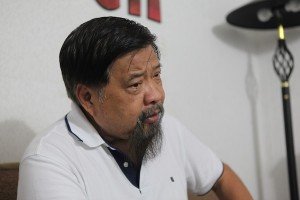Text and interview by ARTHA KIRA PAREDES
Photos and video by AMIEL MARK CAGAYAN
COTABATO CITY— Local leaders in the Autonomous Region in Muslim Mindanao (ARMM) need to change their old habits by committing to clean and honest elections, said an Oblate priest who used to head the panel negotiating peace with Muslim rebel groups.
Father Eliseo Mercado, former chair of the peace panel with the Moro Islamic Liberation Front (MILF) said, “Kung ang mga politiko ay nasa dating gawi pa rin nila, no amount ng bagong registration at ng voters list ay magpapabago ng habit dito o ng kultura (If politicians continue with their old habits, then no new reistration or voters’ list can change the existing culture),” he said.
The ARMM, deemed the “electoral fraud capital of the republic,” went through a general voters’ registration from July 9 to 18 to cleanse its book of voters.
Among the reasons the ARMM’s voters’ book was annulled was that the region had the most number of multiple registrants based on the fingerprint matching done by the Commission on Elections. Other issues hounding its electoral process include minors casting their votes for a fee and hakot or transporting voters from one precinct to another by the hundreds.
“Kung meron commitment yung LGU (local government unit) at lahat ng clean and honest elections magagawa naman yun… pero ang nakita ko eh words lang yung commitment (If LGUs commit to clean and honest elections, then it is possible but from what I see their commitment is just lip service),” Mercado said.
The former president of the Notre Dame College in Cotabato City also said that it might be better for the region to have its own system of selecting leaders because the electoral process requires “high political awareness” which could be difficult because of people’s lack of education and dependence on politicians in ARMM.
Based on National Statistical and Coordination Board’s (NSCB) Gross Enrolment Ratio of primary and secondary schools in the country’s 17 regions, ARMM had the lowest school enrolment rates from school years 2002 to 2003 to 2010 to 2011. NSCB’s 2003 data also show that ARMM had the lowest literacy rate and functional literacy rate at 70.2 and 62.9, respectively.
Mercado said it might be best for families in the region to forge agreements on who should be running. This kind of compromise among town and provincial leaders, he said, has been proven and tested to lessen conflict killings and expenses.

The region should employ its “own way of choosing their own leaders” and not just be copycats of the processes of Luzon and Visayas, said Mercado, who is also the director of the non-government organization Institute for Autonomy and Governance (IAG) whose main thrust is making autonomy “an effective vehicle for peace and development in Southern Philippines.”
Mercado, who took Islamic Studies at the Gregorian University in Rome and who counts among his areas of expertise Islam’s role in the Philippines and Southeast Asia, suggests that the Regional Legislative Assembly (RLA) enact election laws in the region.
ARMM was established through Republic Act 6734 or the Organic Act for ARMM in 1989. This was to “to provide its basic structure of government within the framework of the Constitution and national sovereignty and the territorial integrity of the Republic of the Philippines, and to ensure the peace and equality before the law of all people in the Autonomous Region.”
The regions consist of the provinces of Basilan (except Isabela City that voted no), Sulu, Tawi-Tawi, Lanao del Sur and Maguindanao plus the two cities of Lamitan and Marawi.
In the 2004 elections where the victory of Gloria Macapagal Arroyo as president was marred with accusations of rigging votes in Mindanao, Maguindanao was mentioned in the alleged wiretapped conversation of Arroyo with Comelec Commisioner Virgilio Garcillano.
Click on the multimedia above to listen to Father Mercado.
(ARMM WATCH is a project of VERA Files in partnership with MindaNews, The Asia Foundation and Australian Agency for International Development.)